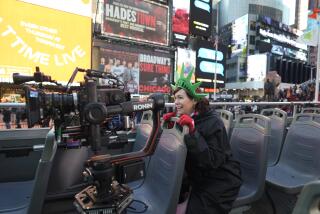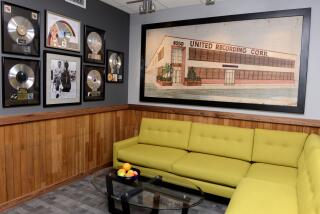Mobile Studio Firm Helps the Cameras Roll
- Share via
In the late 1960s Paul Casella Jr. was working at Twentieth Century-Fox Film Corp. as a transportation captain in charge of organizing a caravan of trucks full of generators, lights, electrical cable and other equipment to drive out to remote motion picture locations. Sometimes there would be more than a dozen trucks, he said, “and production people were always raising hell because you had so many drivers.”
So Casella, along with a few others, got the idea of combining as many as five of the trucks into one jumbo tractor-trailer rig, which would help cut driving costs and create a true mobile studio.
In 1968, with $1,250, Casella bought a used trailer and--after fixing it up on weekends--leased a tractor to pull it. With two electrical generators to power it, he had a mobile studio to rent. For the next few years, by relying on his movie transportation contacts, he was able to lease his mobile studio almost continuously.
Then, in 1971, actor Paul Newman, impressed with the job Casella did managing transportation for the shooting of “The Life and Times of Judge Roy Bean,” insisted that Casella’s name appear in the film’s credits, with the grand title “transportation coordinator.”
By then, Casella knew that he had both the knack and the name to form a company: Transcord Enterprises. So he incorporated and went full time into the mobile studio business.
Today, Casella has 17 mobile studios--some of them 45 feet long--and about 40 other trailers, trucks and pickups used for location filming. Casella’s privately owned Burbank company does about $1.4 million a year in sales. His rivals in the fragmented mobile-studio business say his is the biggest fleet of mobile studios among independents transporting equipment in the filming of many TV series and movies.
In the last year, Casella, 53, said his trucks have been hired to take lights, electrical supplies other equipment to locations for network television shows such as “Moonlighting,” “The Wonder Years,” “thirtysomething,” “Police Story,” and “Beauty and the Beast,” as well as to sites for films such as “Lethal Weapon 2,” “Beaches,” “Alien Nation,” “Midnight Run,” and “The Dead Pool.”
Plenty of Competition
Despite the impressive credits, Casellas hardly has the business to himself. First, the major studios have their own large fleets of trucks, leaving private mobile studio leasers to find jobs with independent film makers and supplementing those fleets for the studios’ biggest efforts.
Casella said that one trick to expanding his business has been to keep costs low. He said he has only four people on Transcord’s payroll: one who keeps the books and three who maintain and modify the trucks. Casella insists that renters of his mobile studios put the drivers on their own payroll. And Casella said he doesn’t even pay himself a salary from Transcord, preferring to plow more profits back into the company while he works part time as a transportation consultant to Columbia Pictures and Warner Brothers.
Casella’s company has grown even as prices to rent his equipment have steadily dropped. Casella said that in the late 1960s, his mobile studiocost as much as $4,800 a week to rent. Today, he said, longtime customers pay $1,350 a week. Casella’s former marketing man said competition drove prices down. But one of his rivals, George Hill, said it was Casella who did the price-cutting.
In the late seventies and early eighties Casella made sure his trucks were all busy, regardless of the fee they commanded, Hill said, Casella “didn’t care particularly how much each vehicle brought in. He just told his agent just to keep them moving.” But Bruce Woollen, who was Transcord’s sales agent during many of those years, denied that Casella purposely underpriced the competition.
Besides George Hill Mobile Studios in Sun Valley, which has two mobile studios, Casella has other independent competitors. Keylite PSI, a Burbank company that leases grip and electrical equipment, just bought five new mobile studios--which they call production vans--enlarging its fleet to ten. Filmtrucks, a New Jersey-based company with an office in North Hollywood, has about five mobile studios in California.
Casella also looks for small advantages where he can find them. He and his wife run travel agencies that specialize in motion picture clients, which helps them keep track of out of town locales selected for filming. Casella’s consulting work for the studios, Hill maintained, is also a boon. “I don’t have an advertising budget,” Casella said. “It’s all by word of mouth.”
And Casella has kept a shrewd eye on competitors, occasionally using profits to buy them out. In 1979, he bought for about $75,000 a manufacturer of portable generators who was selling to Transcord’s rivals. And in 1985, Casella bought a rival mobile studio renter’s seven trucks for about $750,000.
Casella got his start in the movie business driving a catering truck to film locations in 1955 when he was in college. After college, he got a job as a driver for Twentieth Century-Fox. He’s been on the road, one way or another, ever since.
More to Read
The biggest entertainment stories
Get our big stories about Hollywood, film, television, music, arts, culture and more right in your inbox as soon as they publish.
You may occasionally receive promotional content from the Los Angeles Times.










